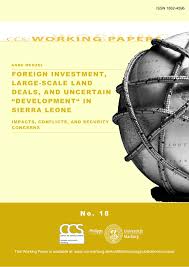FOREIGN INVESTMENT, LARGE-SCALE LAND DEALS, AND UNCERTAIN “DEVELOPMENT“ IN SIERRA LEONE
Sierra Leone recently attracted significant inflows of Foreign Direct Investment (FDI) in export-oriented mining and agribusiness. These investments have usually involved large-scale land deals with local communities that have been facilitated and brokered by government officials, local politicians, and paramount chiefs. Affected people and communities were supposed to receive compensations for lost land and, in addition, they expected to find gainful employment opportunities with multinational companies.








